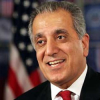Zalmay Khalilzad

Zalmay Khalilzad
Zalmay Mamozy Khalilzadis a U.S. counselor at the Center for Strategic and International Studiesand president of Khalilzad Associates, an international business consulting firm based in Washington, D.C. He was the United States Ambassador to the United Nations under President George W. Bush. He has been involved with U.S. policy makers at the White House, State Department and Pentagon since the mid-1980s, and was the highest-ranking Muslim American in the Administration of U.S. President George W. Bush. Khalilzad's previous assignments in...
NationalityAmerican
ProfessionPolitician
Date of Birth22 March 1951
CountryUnited States of America
The terrorists want civil war. Al-Qaida is attacking Shiites. The Shiite militias are taking revenge on the Sunnis. And the Sunnis are become more extremist, with some joining al-Qaida.
We're dealing with such enormous problems today that we have no other choice but to work together. If Iraq fails, if a religious civil war breaks out and the neighboring states are drawn into this conflict, if the Kurds declare independence and al-Qaida takes over an entire province - that's when the consequences will be dramatic.
Besides, many Islamic movements will change as soon as they gain political responsibility. I'm not at all pessimistic in this regard. Just think of Turkey, where the Islamists are now behaving like a sort of Christian Democratic party in Europe.
I don't believe that military intervention is always the right approach. What we need is a comprehensive strategy, one that advances democratization, economic reforms and equal rights for women.
I consider the modernization of the Middle East the central challenge of our time. This region behaves as if it were disturbed, if you'll excuse the clinical expression.
This not only opens the door for insurgents to permanently renounce violence and join the political process in order to stabilize Iraq, it also isolates the terrorists who are the enemy of all Iraqis, while setting the stage for the emergence of a strong and independent Iraq.
We're going to press very hard for this.
The reaction that's needed by the Iraqis -- they need to come together.
When there have been differences between the various forces with regard to a particular issue, and they've asked for my help, I have proposed to them options for bridging the differences between them. Failure is not an option, and if they need my help, I have told them I'm available at any time.
We will help them if our help is needed. They will have to decide if they need help or not.